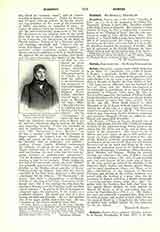

Ruben [REUBEN], a proper name which designates in the Bible: (I) a patriarch; (II) a tribe of Israel.
I. RUBEN, a patriarch, Jacob‘s eldest son (Gen., xlvi, 8; xlix, 3) by Lia, was born in Mesopotamia, and called Ruben (“see ye, a son”) as an allusion to Lia’s distress because of Jacob‘s previous dislike of her: “The Lord saw my affliction: now my husband will love me” (Gen., xxix, 32). Ruben was deprived of his birthright in punishment of an incest which he committed in Chanaan (Gen., xxxv, 22; xlix, 4). It was at his suggestion that instead of killing Joseph, his brothers threw the latter into a pit, whence Ruben vainly hoped to rescue him (Gen., xxxvii, 18-24; 29-30; xlii, 22). When Jacob refused to allow Benjamin to go to Egypt with his brothers, Ruben offered two of his sons as a pledge that Benjamin would be brought back (Gen., xlii, 37). To these few biblical data concerning Jacob‘s firstborn, numerous and worthless Haggadic details are added in rabbinical and apocryphal literature.
II. RUBEN, A TRIBE OF ISRAEL, situated east of Jordan, and sharing with the tribe of Gad, the original territory of the Amorrhite king, Sehon, between the Anion and the Jeboc and as far east as Jaser, the border of the Ammonites. The respective lot of Ruben and Gad cannot be given with perfect accuracy (see Gad), although on the basis of Jos., xiii, 15-23, Ruben’s territorial possessions are usually described as on the east of the Dead Sea and Jordan, between Gad on the north and Moab on the south. Among the prominent towns of the Rubenites were Baalmaon, Bethphogor, Cariathaim, Dibon, Hesebon, Jassa, Medaba, and Sabama. During the journey through the wilderness, the tribe of Ruben counted over 40,000 men (Num., i, 21; xxvi, 7) and marched with Gad and Simeon on the south side of Israel. To the same period are referred the rebellion of the Rubenite chiefs, Dathan and Abiron, against Moses, and its signal punishment (Num., xvi; Deut., xi, 6). After contributing to the conquest of Western Palestine and sharing in the various incidents connected with the erection of a great altar, the descendants of Ruben settled in a district favorable to pastoral pursuits (Num., xxxii; Jos., xxii). Together with the Gadites, they held aloof from the war against Sisara (Judges, v), were smitten by Hazael (IV Kings, x, 32-3), and carried into captivity by Teglathphalasar (734 B.C.). The Rubenites were pre-eminently a pastoral race, little fitted to resist invasion, and several of their cities fell into the hands of Moab (q.v.) long before the tribes east of Jordan were carried captive by the Assyrians
FRANCIS E. GIGOT

